 MyDogBreeds
MyDogBreeds Schweizer Niederlaufhund is originated from Switzerland but Morkie is originated from United States. Schweizer Niederlaufhund may grow 13 cm / 6 inches higher than Morkie. Schweizer Niederlaufhund may weigh 9 kg / 20 pounds more than Morkie. Both Schweizer Niederlaufhund and Morkie has almost same life span. Both Schweizer Niederlaufhund and Morkie has almost same litter size. Both Schweizer Niederlaufhund and Morkie requires Low maintenance.
Schweizer Niederlaufhund is originated from Switzerland but Morkie is originated from United States. Schweizer Niederlaufhund may grow 13 cm / 6 inches higher than Morkie. Schweizer Niederlaufhund may weigh 9 kg / 20 pounds more than Morkie. Both Schweizer Niederlaufhund and Morkie has almost same life span. Both Schweizer Niederlaufhund and Morkie has almost same litter size. Both Schweizer Niederlaufhund and Morkie requires Low maintenance.
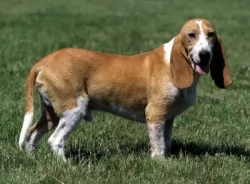 Originating in Switzerland, the Schweizer Niederlaufhund was established around 1900, when hunting became restricted to districts. The Swiss hunter needed a slower dog for the limited territory they could hunt in. Crossing selected Schweizer Laufhunds with Basset Hounds and other selected smaller, short legged hounds developed the Schweizer Niederlaufhund. By 1905 there was already a Schweizer Niederlaufhund Club.
Originating in Switzerland, the Schweizer Niederlaufhund was established around 1900, when hunting became restricted to districts. The Swiss hunter needed a slower dog for the limited territory they could hunt in. Crossing selected Schweizer Laufhunds with Basset Hounds and other selected smaller, short legged hounds developed the Schweizer Niederlaufhund. By 1905 there was already a Schweizer Niederlaufhund Club.
The Niederlaufhund became one of the best hunting dogs in the world, with its powerful body and ability to outhunt the Laufhund in tracking big game. Slower of course than the Laufhund it has a great sense of smell and an ability to easily find wounded animals. There are a few varieties, just like with the Swiss Hound again mostly because of their coloring. The Luzerner Niederlaufhund, the Jura Neiderlaufhund, and the Schwyzerlaufhund. They have musical voices that they use to communicate with the hunters and each other as well as that amazing sense of smell. They can hunt for hours without tiring and without much information from the hunter.
They are a cross breed not recognized by the larger kennel club such as the AKC and the UKC. They are recognized by the Dog Registry of America, Inc. (DRA), the American Canine Association Inc. (ACA) and most importantly by the Federation Cynologique Internationale (FCI). This last one is important because it could lead to recognition as a new breed by the UKC and the AKC.
 These cute little dogs originated in the United States. As a cross between a Maltese Poodle and Yorkshire Terrier, the idea of breeders was to bring out a gorgeous looking little dog that would be low shedding.
These cute little dogs originated in the United States. As a cross between a Maltese Poodle and Yorkshire Terrier, the idea of breeders was to bring out a gorgeous looking little dog that would be low shedding.
The Morkie Poo inherits this low shedding characteristic from the poodle side of things. It is not precisely clear as to when the first Morkie was born, but these days he is as popular as ever.
Certainly, both the parent breeds are recognized with kennel clubs but the Morkie isn’t.
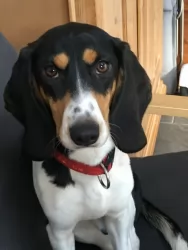 The Schweizer Niederlaufhund is a medium size, short dog. They look like their cousins, the Schweizer Laufhund but smaller. Their body is just slightly longer than it is tall, so you are left with the impression of a mostly square dog. The Niederlaufhund is well put together, with strong legs, a noble head, long droopy ears, broad chest, and a low held tail.
The Schweizer Niederlaufhund is a medium size, short dog. They look like their cousins, the Schweizer Laufhund but smaller. Their body is just slightly longer than it is tall, so you are left with the impression of a mostly square dog. The Niederlaufhund is well put together, with strong legs, a noble head, long droopy ears, broad chest, and a low held tail.
The Small Lucerne Hound has a white cote with smooth speckles of black or gray making them appear to be blue.
The Small Bernese Hound has a tricolor coat of white, tan and black. There are tan marks on the eyebrows. There is a wire haired Small Bernese as well. He has a short beard.
The Small Schwyz Hound is smooth coated in white with orange or yellow-red patches. The wired haired version is extinct.
The Small Jura Hound is a single coated dog with a black coat and tan marking above his eyes as eyebrows as well. He might have some white as well.
 The small Morkie is a crossbreed, and this means you can’t be 100% guaranteed of the dog’s looks. They usually stand at about 24 – 30cm in height and weigh between 4 and 6kg.
The small Morkie is a crossbreed, and this means you can’t be 100% guaranteed of the dog’s looks. They usually stand at about 24 – 30cm in height and weigh between 4 and 6kg.
You also get the Teacup Morkie which is even smaller. The coat of the Morkie can become fairly long and is black, brown and tan.
This is a little crossbreed dog who simply loves spending time with his human family. He is loving and gentle and will get along well with other pets in the home as well as with children.
Some people are inclined to think that these little balls of fluff are a total walkover, but don’t be mistaken, as these cheeky, feisty dogs have attitude. They’re social and playful and love to be involved in games with the kids. Just make sure your children have been taught how to be gentle with a small dog like this.
He becomes very attached to his family and doesn’t want to be left alone for too long.
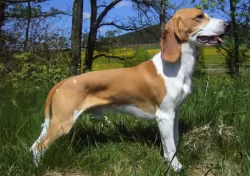 Children friendliness – yes, they are but use caution around small children and small prey.
Children friendliness – yes, they are but use caution around small children and small prey.
3. Adaptability - needs room to run and explore – is very frustrated when confined.
 Your Morkie is such a sweet dog, and that’s to be expected, coming from such sweet parent breeds.
Your Morkie is such a sweet dog, and that’s to be expected, coming from such sweet parent breeds.
He just loves his human family and is friendly and social as well as being loyal. He has quite a bit of attitude, and if you allow it, he’ll develop some horrible small dog syndrome characteristics, such as being snappy, whiny and barking.
Small though he is, training and socialization will do him the world of good and he then lives up to everything wonderful that Morkie dog owners have got to tell you about– playful, friendly fun-loving, jaunty, loving and the cutest little thing there is.
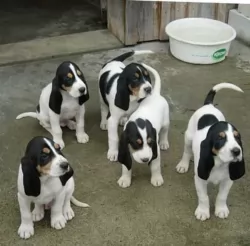 The Niederlaufhund Is prone to a very medical issues to keep an eye on. They include:
The Niederlaufhund Is prone to a very medical issues to keep an eye on. They include:
• Hip Dysplasia – This comes from hip joints that are not well formed and cause reduced mobility and pain. Parents can be tested before the dogs are bred to make sure their hips are good, and that dysplasia will not be passed to puppies. This dysplasia can cause arthritis and even lameness.
• Ear Infections – With long drooping ears it is easy for the dog to acquire ear infections. This is even more so for a hunting dog like the Niederlafhund. It is important to clean the dog’s ears on a regular basis.
 As a responsible dog owner it is to your benefit to be aware of some of the common dog illnesses that your Morkie can succumb too. Not that he is likely too, as with good care, these robust little dogs can live to be 15 years of age or so.
As a responsible dog owner it is to your benefit to be aware of some of the common dog illnesses that your Morkie can succumb too. Not that he is likely too, as with good care, these robust little dogs can live to be 15 years of age or so.
A dog's lifespan can certainly be impacted by the lifestyle they lead. Some of the common dog illnesses to look out for -
Parvo can be a killer, and that’s why your 8 week old puppy needs to have his parvo vaccination. You’ll find puppies in shelters and puppy mills that get parvo. Dogs contact parvo by coming into contact with an infected dog.
Symptoms include vomiting, diarrhea, lethargy and weight loss. Quick medical treatment can save your dog but it is better to ensure he doesn't get it in the first place. Other diseases that require vaccinations are hepatitis, distemper and rabies.
This is a tick-borne illness brought on by bacteria transmitted by deer ticks that attach to the dog. One of the symptoms is lameness in limbs and a loss of appetite. Without treatment, lyme disease can lead to kidney problems.
Prevent your dog getting bloat by ensuring he doesn’t get ravenous with one meal a day. He then wants to wolf his food down. Rather give him smaller meals that he eats slower to avoid bloat. The stomach swells and can actually twist. If your dog has an enlarged stomach, is restless, salivating and wanting to vomit, get him to the vet immediately.
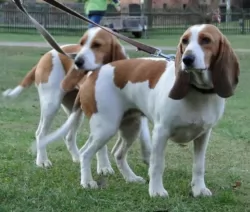 1Feeding the puppy - give 1 cup per day of high quality dog food divided into 3 meals.
1Feeding the puppy - give 1 cup per day of high quality dog food divided into 3 meals.
2.Feeding the adult – give one and one half cups of high quality dog food divided into 2 meals.
4. Games and Exercises – needs a lot of daily exercise and loves field trials, running and activities like barn hunt.
 The Morkie is such a small dog so it won’t require much effort to brush him. Because the hair is thin and fine, you may want to brush him every day just to keep the silky hair from matting.
The Morkie is such a small dog so it won’t require much effort to brush him. Because the hair is thin and fine, you may want to brush him every day just to keep the silky hair from matting.
Many Morkie owners opt to have their Morkie’s trimmed at a professional dog parlor. Check around his eyes and check inside his ears to make sure both are clean and free from infection.
Little dogs always have trouble with their teeth, so make sure to check these regularly. Keep his nails trimmed too as if they grow long they can hook onto things and can cause injury.
The Morkie is an energetic little dog, but because he is small he isn’t going to require too much exercise. A walk now and then will delight him and some ball games indoors or outside. He is a dog that will settle happily into city- or country life, so long as he is with his beloved owner.
Morkies love their food and they can tend to gobble it up. Rather give your Morkie smaller meals than one main meal as he wolfs it down, causing digestive problems.
If you feed him kibble, make sure the packaging is marked for little dogs and make sure its the best there is to ensure he gets the right amount of minerals and vitamins in.
As a treat boil some chicken, brown rice, pasta and vegetables and chop it up very finely and add it into his kibble from time to time.
Make sure your Morkie can easily reach his bowl of fresh, cool water.